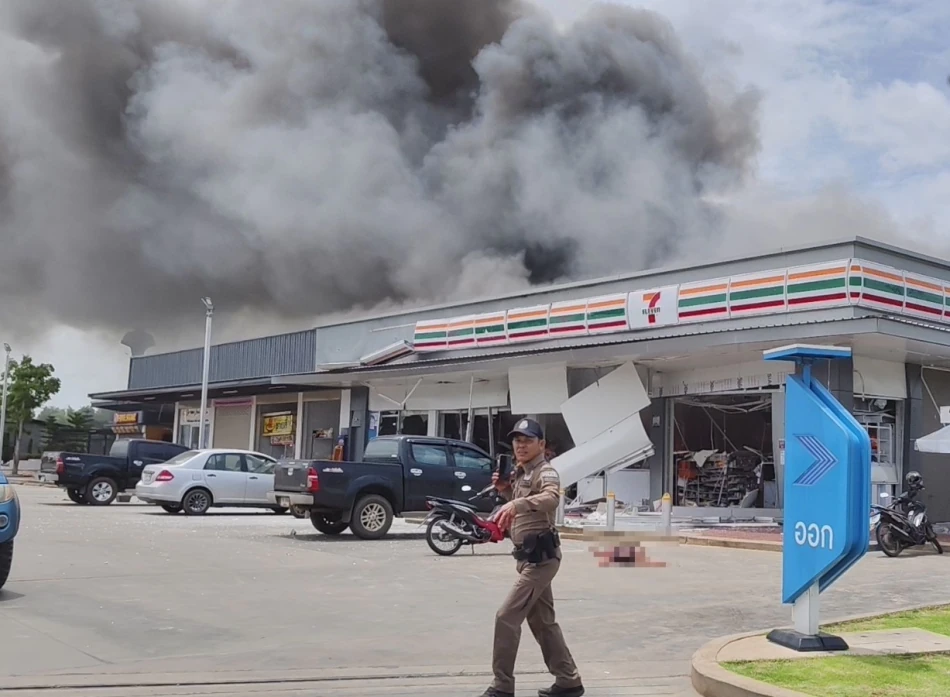
Fierce Clashes and Rocket Strikes on Thailand-Cambodia Border Escalate Tensions
Thailand-Cambodia Border Erupts in Rocket Fire as Diplomatic Crisis Escalates
A dangerous military escalation unfolded along the Thailand-Cambodia border today as armed clashes evolved into rocket attacks, with Thailand accusing its neighbor of deliberately targeting civilians. The violence marks a sharp deterioration in relations between the Southeast Asian neighbors, coming just one day after Thailand expelled Cambodia's ambassador over a landmine incident that injured a Thai soldier.
Civilian Casualties Mount as Rockets Cross Border
The Thai military reported that Cambodian forces launched a targeted attack on civilian areas, with two BM-21 rockets striking Thailand's Surin province. The Soviet-era Grad rockets wounded three civilians, representing a significant escalation from typical border skirmishes that usually involve small arms fire between military units.
The use of BM-21 multiple rocket launchers—weapons designed for battlefield artillery rather than border patrol duties—suggests this was not an accidental spillover of violence but a calculated military response. These weapons have a range of up to 20 kilometers and are typically deployed in serious military confrontations.
Competing Narratives Over Who Started the Fighting
Both nations have offered conflicting accounts of how the violence began, reflecting the deep mistrust that has characterized their border relationship for decades.
Cambodia's Defense
Cambodia's Defense Ministry justified the rocket attack as legitimate self-defense against what it characterized as a Thai military incursion across the border. This framing follows Cambodia's standard diplomatic playbook of portraying itself as the victim of Thai aggression—a narrative that resonates domestically given historical tensions.
Thailand's Version
Thai military officials paint a different picture, claiming the fighting erupted after their forces detected a drone and observed Cambodian soldiers approaching the border fence. This suggests Thailand may have been conducting surveillance operations when the incident began, possibly using the drone activity as justification for defensive positioning.
Diplomatic Breakdown Fuels Military Tensions
The rocket attacks occurred against the backdrop of rapidly deteriorating diplomatic relations. Thailand's expulsion of Cambodia's ambassador on Wednesday—following a landmine explosion that injured a Thai soldier—eliminated a crucial communication channel just as tensions were rising.
This diplomatic breakdown is particularly dangerous given the long history of border disputes between the two countries. Without ambassadorial-level dialogue, military commanders on both sides may feel more pressure to respond forcefully to perceived provocations rather than seeking de-escalation through diplomatic channels.
Historical Context: A Border Defined by Conflict
The Thailand-Cambodia border has been a flashpoint for decades, with disputes rooted in colonial-era boundary demarcation and exacerbated by the chaos of Cambodia's civil war period. The most serious recent confrontation occurred in 2008-2011 over the Preah Vihear temple complex, resulting in dozens of military casualties.
Today's rocket attacks represent the most serious escalation since that temple dispute was resolved through international arbitration. The involvement of heavy weapons and civilian casualties crosses red lines that both militaries had generally respected in previous skirmishes.
Regional Implications and International Response
This escalation poses challenges for ASEAN's principle of non-interference and peaceful conflict resolution. Both Thailand and Cambodia are founding members of the regional bloc, which has historically struggled to mediate disputes between member states effectively.
The timing is particularly awkward as Southeast Asian nations seek to present a united front amid growing great power competition between the United States and China in the region. Border conflicts between ASEAN members undermine the organization's credibility as a force for regional stability.
The international community will likely pressure both sides to return to dialogue quickly, but the expulsion of diplomatic personnel and use of heavy weapons suggest this crisis may require third-party mediation to prevent further escalation.
Most Viewed News

 Sara Khaled
Sara Khaled






